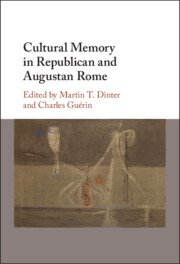Book contents
- Cultural Memory in Republican and Augustan Rome
- Cultural Memory in Republican and Augustan Rome
- Copyright page
- Contents
- Figures
- Contributors
- Acknowledgements
- Chapter 1 Introduction: What is Cultural Memory?
- Part I Writing Cultural Memory
- Part II Politicising Cultural Memory
- Part III Building Cultural Memory
- Chapter 15 Sites of Exemplarity and the Challenge of Accessing the Cultural Memory of the Republic
- Chapter 16 The Festival of the Lupercalia as a Vehicle of Cultural Memory in the Roman Republic
- Chapter 17 Inscriptions on the Capitoline: Epigraphy and Cultural Memory in Livy
- Chapter 18 Cultural Memory and the Role of the Architect in Vitruvius’ De Architectura
- Part IV Locating Cultural Memory
- Bibliography
- Index Locorum
- Index
Chapter 18 - Cultural Memory and the Role of the Architect in Vitruvius’ De Architectura
from Part III - Building Cultural Memory
Published online by Cambridge University Press: 27 April 2023
- Cultural Memory in Republican and Augustan Rome
- Cultural Memory in Republican and Augustan Rome
- Copyright page
- Contents
- Figures
- Contributors
- Acknowledgements
- Chapter 1 Introduction: What is Cultural Memory?
- Part I Writing Cultural Memory
- Part II Politicising Cultural Memory
- Part III Building Cultural Memory
- Chapter 15 Sites of Exemplarity and the Challenge of Accessing the Cultural Memory of the Republic
- Chapter 16 The Festival of the Lupercalia as a Vehicle of Cultural Memory in the Roman Republic
- Chapter 17 Inscriptions on the Capitoline: Epigraphy and Cultural Memory in Livy
- Chapter 18 Cultural Memory and the Role of the Architect in Vitruvius’ De Architectura
- Part IV Locating Cultural Memory
- Bibliography
- Index Locorum
- Index
Summary
The power of place to stir memory was well-known in antiquity, and is exemplified by a speech Cicero places in the mouth of Piso in de Finibus (On Ends). Piso reflects on the Athenian cityscape, and remarks on the capacity of places and the memory associated with them to stir emotion even more strongly than hearing or reading.1 Accordingly, the role of monuments and buildings in Republican memory has been the focus of a good deal of recent scholarship.2 Nor was the mnemonic potential of buildings lost on the princeps himself: as recent work by Eric Orlin and others has shown, architecture played an important role in the Augustan regime, shaping memories of recent events, and stimulating remembrance of a more distant past.3 Examples include the temple of Apollo on the Palatine and the new constructions on the Capitoline (treated elsewhere in this volume), as well as the Forum Augustum, with its statues of Republican notables (the summi viri) evoking a particular model of Roman history.
- Type
- Chapter
- Information
- Cultural Memory in Republican and Augustan Rome , pp. 313 - 330Publisher: Cambridge University PressPrint publication year: 2023

